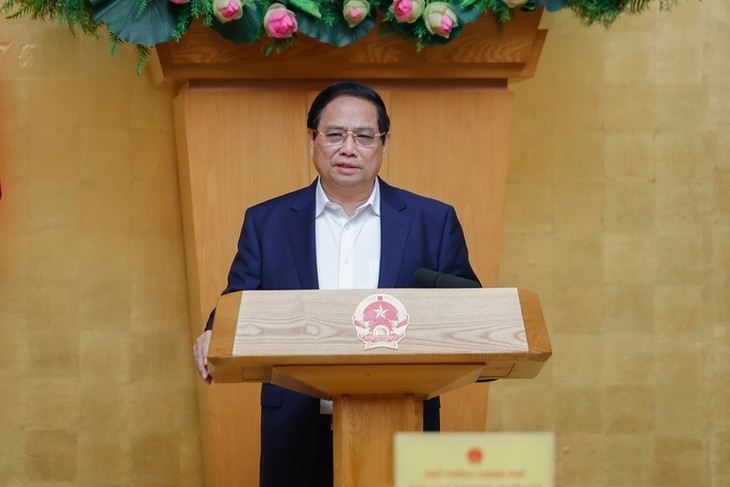(VOVWORLD) - Prime Minister Pham Minh Chinh chaired the regular Government meeting for March and the first quarter of 2025 in Hanoi on Sunday, connecting all 63 provinces and centrally-run cities via online platforms.
 PM Pham Minh Chinh presides over the Government’s monthly meeting and its online conference with local authorities on April 6 (Photo: VGP/Nhat Bac) PM Pham Minh Chinh presides over the Government’s monthly meeting and its online conference with local authorities on April 6 (Photo: VGP/Nhat Bac) |
In his opening remarks, Prime Minister Chinh highlighted several positive developments in recent months, noting that the macroeconomy remains stable, inflation is under control, and key economic balances have been maintained. He reported encouraging signs in production and business activities, continued improvements in living standards, and ensured social security.
The Prime Minister also praised progress in administrative reform, anti-corruption efforts, and the fight against waste and negative practices. He underscored that national independence, sovereignty, and territorial integrity have been firmly safeguarded, while public order and social security remain stable. Meanwhile, external relations and international integration have seen active promotion.
Despite these achievements, Prime Minister Chinh acknowledged ongoing difficulties and emerging challenges including the United States’ recent announcement of tariffs, which may have considerable impacts on Vietnam’s economy. He urged ministries and localities to stay calm and promote Vietnamese people's resilience, creativity, and intelligence to respond flexibly, proactively, and effectively, while also fostering cooperation, expanding and diversifying markets, products, and supply chains.
He emphasized the importance of closely following global developments and swiftly adapting policies to mitigate risks.
Looking ahead to the second quarter and the remainder of 2025, Prime Minister Chinh stressed a dual focus on immediate and long-term priorities. These include preparing for potential trade tensions, particularly reciprocal tariff measures from the US. He said the government will treat this situation as an opportunity to accelerate economic restructuring—reforming markets, production, and export strategies.
He called on ministries, sectors, and local authorities to make concerted efforts to achieve a GDP growth target of 8% or higher.
The Prime Minister also urged streamlining the administrative apparatus and restructuring organizational units to enhance operational efficiency. He emphasized the need to eliminate institutional bottlenecks, simplify administrative procedures, reduce compliance costs, and improve the overall business environment. In parallel, efforts must focus on stimulating growth by revitalizing traditional growth drivers and advancing new ones.